Joint Statement from 23rd GMS Ministerial Conference
This is the joint statement issued at the 23rd GMS Ministerial Conference held in Phnom Penh, Cambodia on 18 November 2019.
4th GMS Energy Transition Task Force Meeting
The 4th GMS Energy Transition Task Force Meeting (ETTF-4) was held on 11 December 2024 in Jakarta, Indonesia. Held on the sidelines of back-to-back events on the ASEAN Power Grid (APG), the 4th ETTF Meeting discussed GMS country and regional updates related to energy transition, plans on regional power trade and demand side management, ETTF work streams, and development partner support for the GMS energy program.
Greater Mekong Subregion countries are in varying stages of economic development but share common goals concerning energy security and environmental protection. Progress have been made in promoting renewable energy, clean fuels, and energy efficiency, but new energy solutions remain crucial to the subregion’s advancement.
The GMS Economic Cooperation Program Strategic Framework 2030 (GMS-2030) emphasizes cross-border power trade, establishment of regional grid codes, development of regional markets, and expanding clean energy investments with a greater role for the private sector.
The Regional Power Trade Coordination Committee (RPTCC) managed regional power trade in the subregion from 2004–2022. In July 2022, at the 29th RPTCC meeting, the committee formally transitioned to the GMS Energy Transition Taskforce (ETTF). Among other things, the transition to ETTF ushers in closer energy cooperation with the Association of Southeast Asian Nations (ASEAN) and its initiatives, such as the ASEAN Power Grid.
Energy consumption in the GMS countries has grown intensively as their economies develop, driven mostly by residential and industrial sectors. Demand is forecasted to increase materially over the medium term.
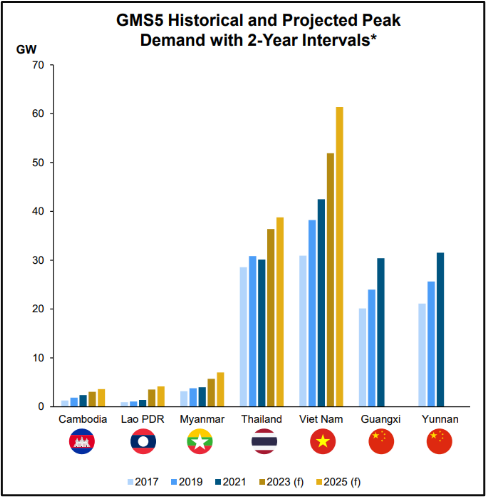
GMS countries have used different approaches to increase access to reliable, affordable, and low-carbon energy.
See initiatives of the GMS Energy Transition Task Force to promote energy security in the subregion in a sustainable manner.
Related
Key Energy Resources
Focal Persons at the Asian Development Bank
Hyunjung Lee
Energy Sector Office
Sectors Group
Atsumasa Sakai
Energy Sector Office
Sectors Group
Other Concerned Staff & Consultants
Joao Aleluia
Energy Sector Office
Sectors Group
Architrandi Priambodo
Energy Sector Office
Sectors Group
Jeffrey Almera
Energy Sector Office
Sectors Group
Amelia Esteban
Energy Sector Office
Sectors Group
Antonio Ressano
Regional Cooperation and Integration Unit
Southeast Asia Department
Rafaelita Jamon
Regional Cooperation and Integration Unit
Southeast Asia Department/GMS Secretariat
Send inquiries to GMS Secretariat.
This is the joint statement issued at the 23rd GMS Ministerial Conference held in Phnom Penh, Cambodia on 18 November 2019.
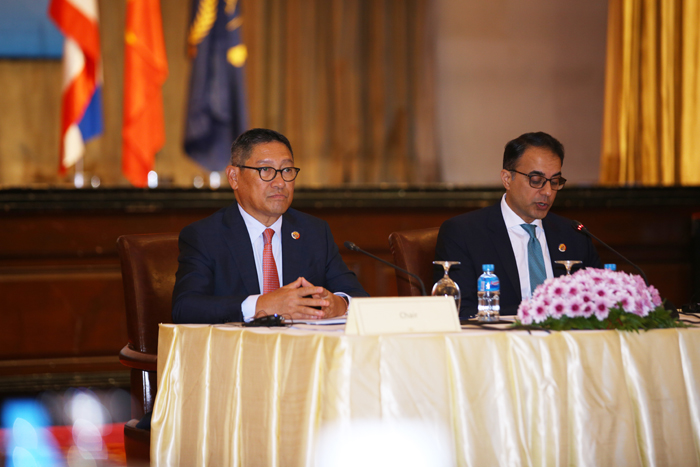
Seated from left: Mr. Sok Chenda Sophea, Minister attached to the Prime Minister, Minister in charge of GMS Cooperation Program/GMS Minister, Secretary General, Council for the Development of Cambodia, and Mr. Ahmed M. Saeed, Vice President for ADB Operations in the Southeast Asia Department, the East Asia Department, and the Pacific Department at the 23rd GMS Ministerial Conference. Photo by ADB.
The Asian Development Bank (ADB) remains committed to supporting the future initiatives of the Greater Mekong Subregion (GMS) Program. Mr. Ahmed M. Saeed, Vice President of ADB, reaffirmed ADB’s support in his speech at the recently-concluded 23rd GMS Ministerial Conference (MC-23). The MC-23 was Mr.
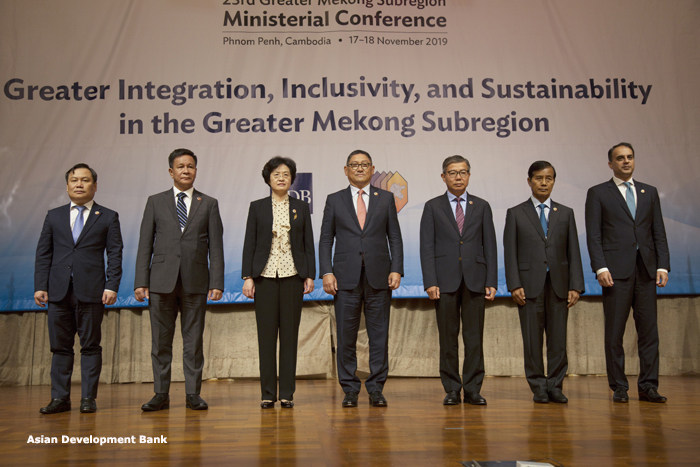
Heads of GMS country delegations participate in the 23rd GMS Ministerial Conference. Standing from left are Mr. Vu Dai Thang, Deputy Minister, Ministry of Planning and Investment, Viet Nam; Mr. Aung Htoo, Deputy Minister, Ministry of Commerce, Myanmar; Ms. Cheng Lihua, Vice Minister, Ministry of Finance, PRC; Mr. Sok Chenda Sophea, Minister attached to the Prime Minister, Minister in charge of GMS Cooperation Program/GMS Minister, Secretary General, Council for the Development of Cambodia; Mr. Viengsavath Siphandone, Deputy Minister, Ministry of Public Works and Transport, Lao PDR; Mr. Thaworn Senneam, Deputy Minister, Ministry of Transport, Thailand; and Mr. Ahmed M. Saeed, Vice President for ADB Operations in the Southeast Asia Department, the East Asia Department, and the Pacific Department. Photo by ADB.
The Royal Government of Cambodia and the Asian Development Bank (ADB) organized the 23rd GMS Ministerial Conference on 17-18 November 2019 in Phnom Penh, Cambodia, with the theme “Greater Integration, Inclusivity and Sustainability in the GMS.” The meeting brought together GMS Ministers and Senior Officials of the six GMS countries—Cambodia, the People’s Republic of China (PRC), Lao People’s Democrati
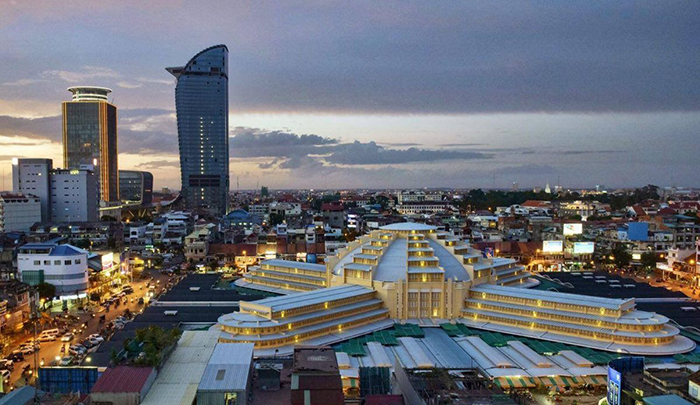
Phnom Penh skyline reflecting the city's rapid growth. The Central Market, built in 1937, is seen in the foreground. Photo by Lor Teng Huy - own work, CC BY-SA 4.0
The Ministers of the six member countries of the Greater Mekong Subregion (GMS) are set to lay the groundwork for the preparation for the 7th GMS Summit of Leaders.
Hosted by the Royal Government of Cambodia and the Asian Development Bank (ADB), the 23rd GMS Ministerial Conference (MC-23) will take place in Phnom Penh on 18 November 2019, with the theme "Greater Integration, Inclusivity and Sustainability in the GMS.”
The Lao People’s Democratic Republic (PDR), Malaysia, and Thailand confirmed the second phase of the Lao PDR, Thailand, and Malaysia Power Integration Project (LTM-PIP) at the 37th ASEAN Ministers on Energy Meeting (AMEM) held on 4 September 2019 in Bangkok, Thailand.
Lao PDR sells electricity to Malaysia using Thailand’s electricity transmission network through the LTM-PIP. The second phase expands Lao PDR’s electricity export from 100 megawatts to a maximum of 300 MW.
The Nam Ngiep 1 Hydropower Project in Bolikhamxay, Lao Democratic Republic (Lao PDR), started generating electricity for export to Thailand in early September 2019, becoming the latest fully operational Independent Power Producer in the country.
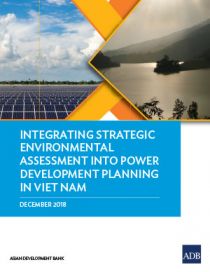
This publication presents the integration of a strategic environmental assessment in the revised Power Development Plan VII of Viet Nam.
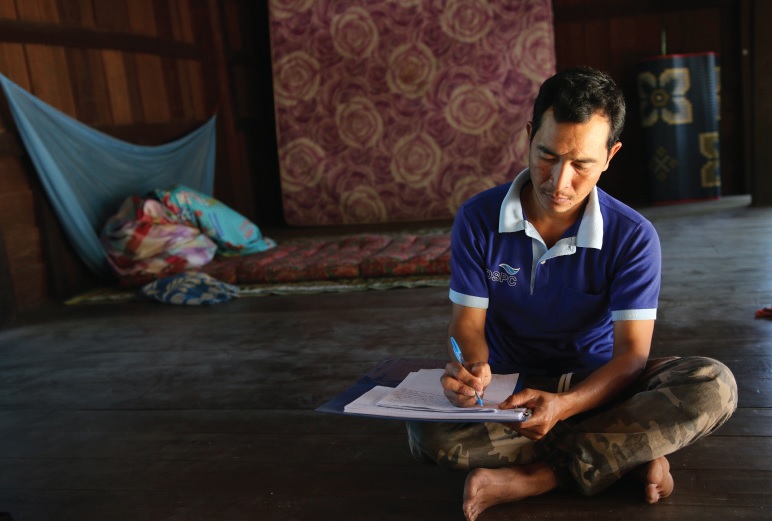
Khamking Koemany is a homestay provider on Don Khon Island, one of the popular sites for tourists visiting the Four Thousand Islands group on the Mekong River in Champasack Province. His business has flourished since he received training in tourism services under the GMS Sustainable Tourism Development Project. Photo: ADB.
Blessed with rich natural resources and a strategic location at the heart of the Greater Mekong Subregion, the Lao People’s Democratic Republic has emerged from decades of turmoil and isolation to become one of the fastest growing economies in Southeast Asia since 2011.
An initiative funded by Switzerland and the United States is proposing to enhance regional cooperation in sustainable energy development to protect Viet Nam’s Mekong Delta from rising sea levels and other climate risks.
Myanmar has completed the first phase of its first solar power plant, which will add 40 megawatts (MW) to the national power grid.